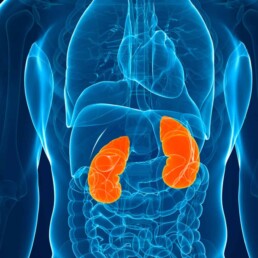Kidney disease remains a silent threat affecting millions worldwide, with the United States recording significant numbers in its grip. The link between smoking and kidney disease progression is well-established, posing an additional risk to those with lifestyle-related or genetic predispositions to renal ailments. Understanding this link is crucial for prevention strategies and health education.

By Majd Isreb, MD, FACP, FASN, IFMCP
Kidney disease: A silent global challenge
Kidneys, the sophisticated filtration system of the body, are vital to maintaining overall health. When chronic kidney disease (CKD) strikes, it often does so silently, gradually diminishing the kidneys’ ability to cleanse the blood of toxins. Globally, CKD is a rising health concern, with a prevalence that suggests an urgent need for widespread public health initiatives and lifestyle modifications.
The Correlation Between Smoking and Rising Kidney Disease Rates
Recent comprehensive meta-analyses provide compelling evidence that cigarette smoking stands as a potent independent risk factor for the onset of CKD. These studies shed light on the heightened vulnerability of current smokers, who face a substantially higher risk of developing CKD when compared to non-smokers. The risk escalates with the duration and intensity of smoking, indicating a cumulative effect that worsens over time.
Notably, the incidence of CKD in smokers is often seen in conjunction with other serious conditions, such as hypertension and diabetes mellitus, which are primary contributors to kidney disease worldwide. Smokers who develop CKD are, therefore, usually classified as hypertensive or diabetic kidney disease.
How smoking accelerates kidney disease: The biological backdrop
Smoking’s role in the development of CKD is not limited to increasing its onset; it also significantly hastens its advancement. Research indicates that individuals with CKD who have a smoking history, even if it totals fewer than 15 pack-years, are more susceptible to an accelerated decline in kidney function. This susceptibility intensifies with prolonged smoking habits.
However, there’s a silver lining: the likelihood of CKD progression diminishes progressively the longer an individual remains abstinent from smoking. Therefore, quitting smoking emerges not only as a preventive measure but also as a critical strategy for slowing the progression of CKD, providing hope for improved outcomes in former smokers.
The conversation around smoking and kidney disease progression is, therefore, critical. Smoking introduces toxins that have a direct impact on renal function. These toxins trigger oxidative stress and damage the vascular endothelium, the inner lining of blood vessels. As a consequence, blood vessels may narrow, leading to diminished circulation to the kidney. This restriction can intensify issues such as hypertension and inflammation, both of which are critical contributors to the onset and progression of CKD.
The role of cadmium exposure from smoking in kidney disease progression
Cadmium, a heavy metal found in cigarette smoke, is another insidious factor in the narrative of smoking and kidney disease progression. This toxic metal accumulates in the kidneys, where it can cause significant damage to the renal tubules, leading to a decrease in their filtering capacity. Long-term exposure to cadmium from smoking not only increases the risk of developing kidney disease but also exacerbates existing conditions, making it a double threat.
Studies have shown that each cigarette exposes the smoker to 0.5-1 microgram of cadmium. Lead has also been found in cigarettes. High blood levels of lead were found in smokers as compared to non-smokers.
Interplay between sleep patterns, smoking habits, and kidney health
Recent findings from the National Health and Nutrition Examination Survey (NHANES) 2017–2018 shed light on the intricate dynamics between sleep, smoking, and kidney function. The study, which classified participants into subgroups based on their smoking frequency and sleep duration (short, normal or long), revealed that individuals with shorter sleep spans exhibited higher levels of serum cotinine, a marker of nicotine intake
Non-smokers with either excessively short or long sleep durations had lower estimated glomerular filtration rates (eGFR) — a key indicator of kidney function — compared to those who smoked every day and slept less than 6 hours. The relationship between sleep duration and kidney function varied based on smoking status. Interestingly, habitual smokers experienced an increase in eGFR with reduced sleep, whereas occasional smokers showed improved kidney function with longer sleep.
Notably, for non-smokers, a normal sleep duration not only correlated with optimal eGFR levels, displaying a U-shaped relationship, but also emerged as a significant protective factor for kidney health, underscoring the importance of balanced sleep, particularly for individuals who do not smoke.
Join us to end the kidney disease epidemic
Analyzing the incidence of kidney disease in the US
In the United States, the incidence of kidney disease has been a growing concern, with current estimates indicating that over 37 million Americans are affected. This number is not merely a statistic; it represents a widespread public health issue with profound personal and economic impacts. The role of smoking in this is significant, with smokers having a higher likelihood of albuminuria, an early marker of CKD.
Smoking and kidney disease progression: A preventable risk factor
Smoking and kidney disease progression is a modifiable risk factor. Smoking cessation is a powerful intervention, with evidence showing that quitting can slow down the progression of CKD, especially in the early stages. Public health campaigns and clinical interventions often focus on smoking cessation as a critical component of kidney disease management.
The global picture: Smoking and kidney disease incidence
Worldwide, the incidence of kidney disease varies, influenced by factors such as genetics, healthcare infrastructure, and lifestyle choices, including smoking. The global health community recognizes the necessity of addressing smoking as part of the strategy to reduce the burden of CKD. Initiatives like World Kidney Day underscore the importance of lifestyle choices on kidney health.
The way forward: Combating smoking to protect kidney health
To disrupt the trajectory of smoking and kidney disease progression, a multifaceted approach is essential. This includes policy-driven actions like smoking bans, taxation, and education campaigns, alongside clinical strategies such as screening programs and personalized interventions for those at risk.
The bottom line
In conclusion, the intertwining of smoking and the progression of kidney disease presents a clear message: prevention is possible. Tackling smoking habits can play a pivotal role in reducing the incidence of kidney disease both in the U.S. and around the world. As healthcare providers, policymakers, and individuals, the collective effort to diminish the impact of smoking on renal health is not only necessary but imperative for a healthier global population.







